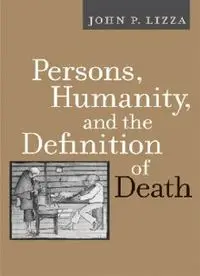
Persons, Humanity, and the Definition of Death PDF
Preview Persons, Humanity, and the Definition of Death
Persons, Humanity, and the Definition of Death Recent and Related Titles in Bioethics Nancy Berlinger After Harm: Medical Error and the Ethics of Forgiveness Grant R. Gillett Bioethics in the Clinic: Hippocratic Reflections Carol Levine and Thomas H. Murray, eds. The Cultures of Caregiving: Conflict and Common Ground among Families, Health Professionals, and Policy Makers Eric Parens, Audrey R. Chapman, and Nancy Press, eds. Wrestling with Behavioral Genetics: Science, Ethics, and Public Conversation Mark A. Rothstein, Thomas H. Murray, Gregory E. Kaebnick, and Mary Anderlik Majumder, eds. Genetic Ties and the Family: The Impact of Paternity Testing on Parents and Children Stuart J. Youngner, Robert M. Arnold, and Renie Schapiro, eds. The Definition of Death: Contemporary Controversies Thomas H. Murray, consulting editor in bioethics Persons, Humanity, and the Definition of Death j o h n p. l i z z a Professor Department of Philosophy Kutztown University of Pennsylvania Kutztown, Pennsylvania The Johns Hopkins University Press Baltimore © 2006 The Johns Hopkins University Press All rights reserved. Published 2006 Printed in the United States of America on acid-free paper 2 4 6 8 9 7 5 3 1 The Johns Hopkins University Press 2715 North Charles Street Baltimore, Maryland 21218-4363 www.press.jhu.edu Library of Congress Cataloging-in-Publication Data Lizza, John P., 1957– Persons, humanity, and the definition of death / John P. Lizza. p. ; cm. Includes bibliographical references and index. ISBN 0-8018-8250-8 (hardcover : alk. paper) 1. Death—Proof and certification. 2. Brain death. 3. Humanity. 4. Persons. 5. Medical jurisprudence. [DNLM: 1. Death. 2. Brain Death. 3. Jurisprudence. 4. Personhood. 5. Public Policy. W 820 L789p 2006] I. Title. RA1063.L59 2006 614⬘.1—dc22 2005013360 A catalog record for this book is available from the British Library. For Kristiina, Kiira, Sofia, and Elena This page intentionally left blank Contents Preface ix Introduction: The Biological Paradigm of Death 1 1 Establishment of the Biological Paradigm 7 2 Defining Death: Beyond Biology 17 3 Concepts of Person 34 4 Persons as Substances 51 5 The Constitutive View of Persons 63 6 Persons as Human Organisms 94 7 Persons as Qualities or Phases of Human Organisms 111 8 Public Policy and the Definition of Death 151 Notes 181 References 193 Index 207 This page intentionally left blank Preface This work challenges the “biological paradigm” of death that has provided the theoretical grounding for acceptance of “brain death” as death. Whereas the para- digm treats human or personal death as a strictly biological matter, I hope to show that human or personal death is no less a metaphysical, ethical, and cultural matter than a biological one and that such considerations are necessary to justify any par- ticular definition and criteria for death. In chapter 1, I examine how the biological paradigm of death came to be estab- lished. Some of the initial work on whether to expand the criteria for determining death to include neurological criteria did not endorse the paradigm. Instead, there was recognition that defining death and choosing criteria for its determination were not strictly biological matters. Certain beliefs in the paradigm of death were needed, however, to justify acceptance of the “whole-brain” neurological criterion for deter- mining death as opposed to retaining only the traditional circulatory and respiratory criteria or moving to a higher-brain or consciousness-related criterion for death. Three different biological definitions of death have been proposed by theorists who work within the paradigm: Bernat, Culver, and Gert (1981); Becker (1975); and Rosenberg (1983). In chapter 2, I show how these proposals fail because they need to be supplemented by a more ontologically and ethically informed view of the na- ture of what dies (i.e., the human being or person). In chapter 3, I discuss how alternative concepts of personhood affect the defini- tion of death. Simplifying the account somewhat, I distinguish three concepts of per- sonhood: (1) a species concept that strictly identifies the person with the human or- 1 ganism or body; (2) a qualitative or functionalist concept that identifies the person 2 with certain abilities and qualities of awareness; and (3) a substantive concept that treats the person not as some qualitative or functional specification of some more ba- sic kind of thing (e.g., a human organism) but as a primitive substance that has psy- 3 chological and corporeal characteristics. Relying on these distinctions, I show how parties in the debate over the definition of death have used different concepts of per
